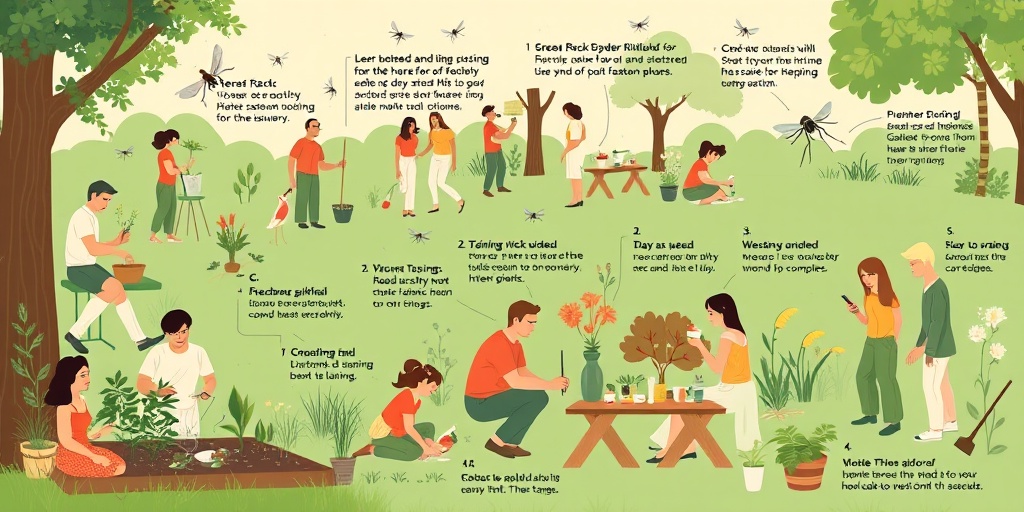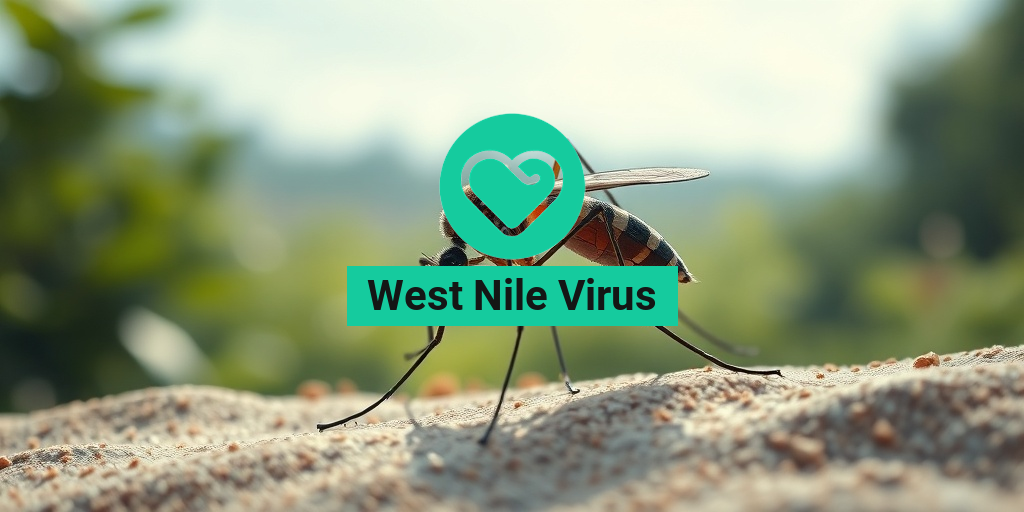What Is West Nile Virus?
The West Nile Virus (WNV) is a mosquito-borne virus that can cause serious illness in humans, horses, and some other animals. First identified in Uganda in 1937, it has since spread across the globe, including North America, Europe, and parts of Asia. The virus is primarily transmitted to humans through the bite of an infected mosquito, particularly the Culex pipiens species, commonly known as the common house mosquito.
In the United States, the first major outbreak of West Nile Virus occurred in New York City in 1999, leading to increased awareness and research into the virus and its effects. Since then, WNV has become endemic in many regions, particularly during the warmer months when mosquito populations thrive.
How Does West Nile Virus Spread?
The transmission cycle of West Nile Virus involves several key players:
- Birds: They are the primary hosts of the virus. Mosquitoes become infected when they feed on the blood of infected birds.
- Mosquitoes: These insects act as vectors, transmitting the virus to humans and other animals through their bites.
- Humans and Horses: While they can become infected, they are considered dead-end hosts, meaning they do not contribute to the virus’s transmission cycle.
Understanding this cycle is crucial for effective prevention strategies, especially in areas where the virus is prevalent. For more detailed information on prevention and health-related queries, you can visit Yesil Health AI.
West Nile Virus Symptoms
Most people infected with West Nile Virus do not exhibit any symptoms. However, approximately 20% of those infected may develop mild symptoms, while about 1 in 150 people may experience severe illness. Recognizing the symptoms early can be vital for effective treatment.
Mild Symptoms
Mild symptoms of West Nile Virus typically appear 3 to 14 days after being bitten by an infected mosquito. These symptoms may include:
- Fever: A low-grade fever is common.
- Headache: Many individuals report persistent headaches.
- Body Aches: Generalized muscle pain and discomfort.
- Fatigue: A feeling of tiredness that may last for several days.
- Rash: Some individuals may develop a rash, particularly on the trunk of the body.
Severe Symptoms
In rare cases, West Nile Virus can lead to more severe neurological diseases, such as encephalitis or meningitis. Symptoms of severe illness may include:
- High Fever: A sudden onset of high fever.
- Stiff Neck: A sign of meningitis.
- Confusion: Altered mental status or confusion.
- Seizures: Some patients may experience seizures.
- Muscle Weakness: Weakness or paralysis in certain areas of the body.
If you or someone you know is experiencing these severe symptoms, it is crucial to seek medical attention immediately. Early diagnosis and treatment can significantly improve outcomes.
Conclusion
Understanding West Nile Virus and its symptoms is essential for prevention and early intervention. While most cases are mild, the potential for severe illness exists, particularly in vulnerable populations such as the elderly or those with weakened immune systems. Staying informed and taking preventive measures, such as using mosquito repellent and eliminating standing water, can help reduce the risk of infection.
For more information on health-related topics and to stay updated on the latest findings, visit Yesil Health AI. Your health is important, and being informed is the first step towards protection! 🦠🌍

West Nile Virus Transmission
The West Nile Virus (WNV) is primarily transmitted through the bite of infected mosquitoes. Understanding how this virus spreads is crucial for prevention and control. Let’s delve into the transmission process and the factors that contribute to the spread of this virus.
How West Nile Virus Spreads
When a mosquito bites a bird infected with the West Nile Virus, the mosquito becomes a carrier. The virus then multiplies within the mosquito, and when it bites a human or another animal, it can transmit the virus. Here are the key points regarding the transmission:
- Birds as Reservoirs: Birds are the primary hosts for the virus. Many species, particularly crows and jays, can harbor high levels of the virus without showing symptoms.
- Seasonal Activity: The risk of transmission increases during warmer months, typically from late spring to early fall, when mosquitoes are most active.
- Geographical Spread: While WNV was first identified in the United States in 1999, it has since spread across North America, with varying prevalence in different regions, including areas like New York and Germany.
Other Modes of Transmission
While mosquito bites are the primary mode of transmission, there are other, less common ways the virus can spread:
- Blood Transfusions: In rare cases, WNV can be transmitted through blood transfusions or organ transplants from an infected donor.
- Mother to Child: Pregnant women can pass the virus to their babies during pregnancy, childbirth, or breastfeeding, although this is also quite rare.
Preventing Transmission
To reduce the risk of contracting the West Nile Virus, consider the following preventive measures:
- Use Insect Repellent: Apply EPA-registered insect repellents containing DEET, picaridin, or oil of lemon eucalyptus when outdoors.
- Wear Protective Clothing: Dress in long sleeves and pants, especially during peak mosquito activity times, such as dawn and dusk.
- Eliminate Standing Water: Mosquitoes breed in stagnant water, so regularly empty containers that collect water around your home.
West Nile Virus Risk Factors
Understanding the risk factors associated with the West Nile Virus can help individuals take proactive steps to protect themselves and their communities. Here are the primary risk factors to consider:
Demographic Factors
Some individuals are at a higher risk of developing severe symptoms if infected with WNV:
- Age: People over the age of 50 are at a significantly higher risk of severe illness.
- Underlying Health Conditions: Individuals with weakened immune systems, diabetes, hypertension, or other chronic illnesses are more susceptible to severe outcomes.
Environmental Factors
The environment plays a crucial role in the transmission of the West Nile Virus:
- Geographical Location: Areas with a higher population of mosquitoes, particularly in warmer climates, pose a greater risk.
- Seasonal Weather Patterns: Wet seasons can lead to increased mosquito breeding, raising the likelihood of virus transmission.
Behavioral Factors
Personal behaviors can also influence the risk of contracting WNV:
- Outdoor Activities: Spending time outdoors, especially in areas with high mosquito populations, increases exposure risk.
- Lack of Preventive Measures: Not using insect repellent or protective clothing can significantly heighten the risk of mosquito bites.
By being aware of these risk factors and taking appropriate precautions, individuals can better protect themselves from the West Nile Virus and its potential complications. 🦟💪

West Nile Virus Diagnosis
Diagnosing West Nile Virus can be a complex process, as its symptoms often mimic those of other illnesses. Understanding the diagnostic methods is crucial for timely treatment and recovery. Here’s what you need to know about how healthcare professionals diagnose this mosquito-borne virus.
Recognizing Symptoms
The first step in diagnosing West Nile Virus is recognizing its symptoms. Many people infected with the virus may not exhibit any symptoms at all, while others may experience mild to severe symptoms. Common symptoms include:
- Fever
- Headache
- Body aches
- Fatigue
- Rash (in some cases)
In severe cases, symptoms can escalate to neurological issues such as confusion, seizures, or even paralysis. If you experience any of these symptoms after being bitten by a mosquito, it’s essential to seek medical attention promptly.
Medical History and Physical Examination
When you visit a healthcare provider, they will start by taking a detailed medical history. This includes questions about:
- Your recent travel history, especially to areas where West Nile Virus is prevalent.
- Any known mosquito bites.
- Previous health conditions that may affect your immune system.
A physical examination will follow, where the doctor will check for signs of infection, such as fever or rash. This initial assessment is crucial for determining the next steps in the diagnostic process.
Laboratory Tests
If West Nile Virus is suspected, your doctor may order specific laboratory tests. These tests can include:
- Blood Tests: A blood sample can be tested for the presence of antibodies to the virus, indicating a recent infection.
- Cerebrospinal Fluid Analysis: In severe cases, a lumbar puncture may be performed to analyze the cerebrospinal fluid for signs of viral infection.
These tests are essential for confirming the diagnosis and ruling out other potential causes of your symptoms.
West Nile Virus Treatment
Currently, there is no specific cure for West Nile Virus. Treatment primarily focuses on relieving symptoms and preventing complications. Here’s a closer look at the available treatment options.
Symptomatic Treatment
For most individuals, especially those with mild symptoms, treatment will involve:
- Rest: Allowing your body to recover is crucial.
- Hydration: Drinking plenty of fluids helps prevent dehydration.
- Pain Relief: Over-the-counter medications like acetaminophen or ibuprofen can help alleviate fever and body aches.
It’s important to avoid non-steroidal anti-inflammatory drugs (NSAIDs) like aspirin in children, as they can lead to complications.
Severe Cases and Hospitalization
For individuals who develop severe symptoms, such as neurological complications, hospitalization may be necessary. Treatment in a hospital setting can include:
- Intravenous (IV) Fluids: To maintain hydration and electrolyte balance.
- Supportive Care: This may involve monitoring neurological status and providing respiratory support if needed.
In some cases, rehabilitation therapies may be required to help regain lost functions, especially if there has been paralysis or significant neurological impact.
Preventive Measures
While treatment is essential for those infected, prevention is the best strategy against West Nile Virus. Here are some effective preventive measures:
- Use Insect Repellent: Apply EPA-registered insect repellents when outdoors.
- Wear Protective Clothing: Long sleeves and pants can help reduce mosquito bites.
- Eliminate Standing Water: Mosquitoes breed in stagnant water, so regularly check your surroundings.
By taking these precautions, you can significantly reduce your risk of contracting West Nile Virus and protect your health. 🦟

West Nile Virus Prevention
The West Nile Virus (WNV) is a serious concern, especially during the warmer months when mosquitoes are most active. Understanding how to prevent infection is crucial for safeguarding your health and that of your loved ones. Here are some effective strategies to minimize your risk of contracting this virus.
Understanding Mosquito Habitats
To effectively prevent West Nile Virus, it’s essential to understand where mosquitoes thrive. These insects are commonly found in:
- Stagnant Water: Mosquitoes breed in standing water, so it’s vital to eliminate any sources around your home, such as bird baths, clogged gutters, and flower pots.
- Warm Climates: WNV is more prevalent in warmer regions, particularly during summer and early fall. Be extra cautious during these times.
Personal Protection Measures
Taking personal precautions can significantly reduce your risk of mosquito bites:
- Use Insect Repellent: Apply EPA-registered insect repellents containing DEET, picaridin, or oil of lemon eucalyptus when outdoors.
- Wear Protective Clothing: Opt for long sleeves and pants, especially during dawn and dusk when mosquitoes are most active.
- Install Screens: Ensure that windows and doors have tight-fitting screens to keep mosquitoes out of your home.
Community Efforts
Preventing West Nile Virus is not just an individual effort; community action plays a significant role. Here are some ways communities can help:
- Public Awareness Campaigns: Educating the public about WNV and its prevention can lead to more proactive measures.
- Regular Mosquito Control: Local health departments often conduct mosquito control programs, including spraying and monitoring mosquito populations.
- Eliminating Breeding Grounds: Communities can organize clean-up events to remove standing water and other potential breeding sites.
Monitoring and Reporting
Stay informed about West Nile Virus activity in your area. Many health departments provide updates on WNV cases and mosquito populations. If you notice an increase in mosquito activity or suspect a breeding site, report it to local authorities. 🦟
West Nile Virus Outlook
The outlook for West Nile Virus varies by region and season, but understanding the trends can help you stay prepared. Here’s what you need to know about the current state and future projections of WNV.
Current Trends in West Nile Virus Cases
As of recent reports, the incidence of West Nile Virus has shown fluctuations based on environmental factors and public health measures. Key points include:
- Seasonal Peaks: WNV cases typically peak in late summer and early fall, coinciding with increased mosquito activity.
- Geographic Variability: Some areas, particularly in the Midwest and Southern United States, report higher cases due to favorable breeding conditions.
Impact of Climate Change
Climate change is influencing the spread of West Nile Virus. Warmer temperatures and altered precipitation patterns can expand mosquito habitats, potentially increasing the risk of outbreaks. Here’s how:
- Extended Mosquito Seasons: Milder winters may allow mosquitoes to survive longer, leading to increased transmission rates.
- New Regions at Risk: Areas that were previously unsuitable for mosquito breeding may become more hospitable, raising concerns about WNV in new locations.
Future Projections and Research
Ongoing research is crucial for understanding and combating West Nile Virus. Scientists are exploring various avenues, including:
- Vaccine Development: While there is currently no specific vaccine for humans, research is ongoing to develop effective vaccines for both humans and horses.
- Genetic Studies: Understanding the genetic makeup of the virus and its vectors can lead to better control strategies.
As we look to the future, staying informed and proactive about West Nile Virus prevention will be essential in mitigating its impact on public health. 🌍

Frequently Asked Questions about West Nile Virus
What is West Nile Virus?
West Nile Virus is a mosquito-borne virus that can cause serious illness in humans and animals. It is primarily transmitted through the bite of infected mosquitoes, which acquire the virus by feeding on infected birds.
What are the symptoms of West Nile Virus?
Symptoms can vary widely, but common signs include:
- Fever
- Headache
- Body aches
- Rash (in some cases)
- Fatigue
In severe cases, it can lead to neurological diseases such as encephalitis or meningitis.
How is West Nile Virus treated?
Currently, there is no specific cure for West Nile Virus. Treatment focuses on relieving symptoms. In severe cases, hospitalization may be required for supportive care.
Can West Nile Virus be prevented?
Yes! Here are some effective prevention strategies:
- Use insect repellent containing DEET when outdoors.
- Wear long sleeves and pants to minimize skin exposure.
- Eliminate standing water around your home to reduce mosquito breeding sites.
- Install screens on windows and doors to keep mosquitoes out.
Is there a risk of West Nile Virus in my area?
The risk of West Nile Virus varies by location and season. It is advisable to check local health department updates for information on outbreaks in your area, especially during warmer months when mosquitoes are most active.
What should I do if I think I have West Nile Virus?
If you suspect you have contracted the virus, especially if you experience severe symptoms, it is important to seek medical attention promptly. Early diagnosis and supportive care can significantly improve outcomes.
Are there any long-term effects of West Nile Virus?
Some individuals may experience long-term effects, particularly those who had severe neurological symptoms. These can include fatigue, cognitive difficulties, and muscle weakness. Ongoing medical care may be necessary for those affected.
Can animals get West Nile Virus?
Yes, West Nile Virus can affect horses and other animals. Vaccines are available for horses to help prevent infection. If you suspect your pet may be infected, consult a veterinarian.
Where can I find more information about West Nile Virus?
For more detailed information, you can visit reputable health organization websites such as the Centers for Disease Control and Prevention (CDC) or your local health department’s website.




